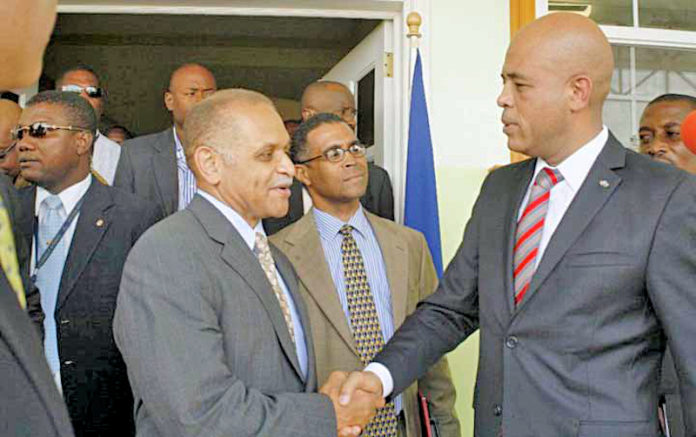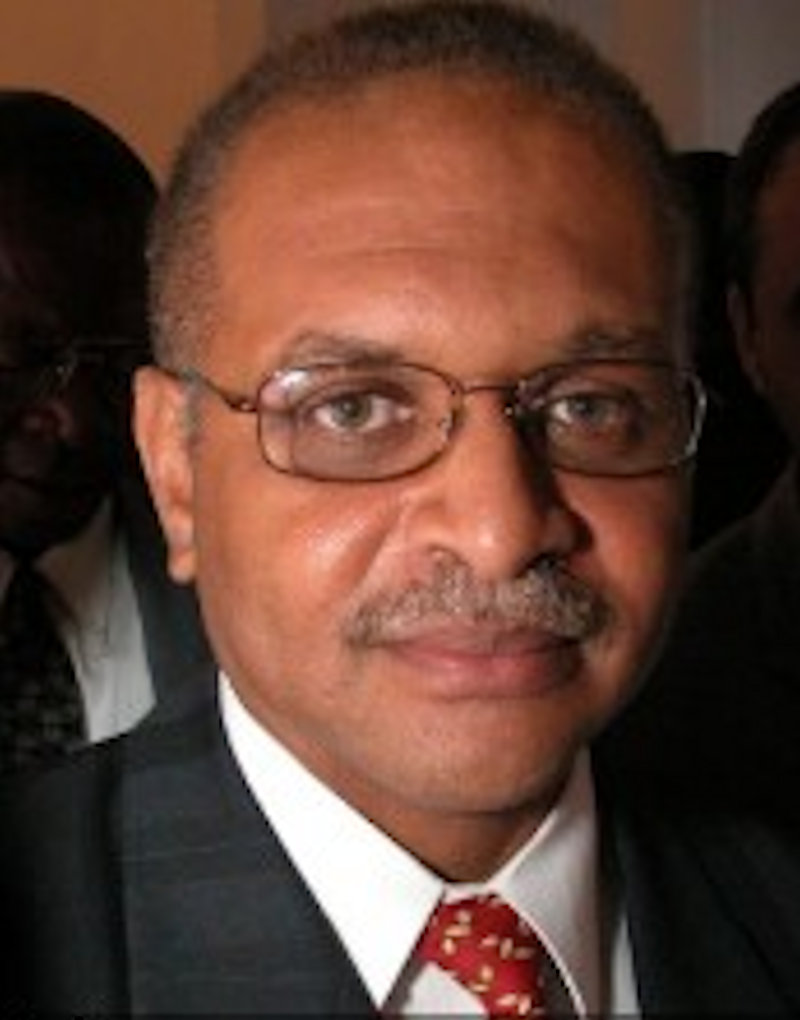
Bernard Gousse, whom Haitian President Michel Martelly nominated for Prime Minister on Jul. 6, was so repressive, uncontrollable and ineffective as Haiti’s de facto Justice Minister seven years ago that Washington and its Haitian and international allies forced his resignation, secret U.S. Embassy cables show.
The cables were among a trove of 1,918 Haiti-related U.S. Embassy dispatches provided by the media organization WikiLeaks to Haïti Liberté.
the U.S. Embassy in Port-au-Prince called Gousse a “complete failure” as Justice Minister.
“He’s an honest man. He has experience in public administration,” Martelly’s chief of staff Thierry Mayard-Paul told The Associated Press. “We believe that Mr. Gousse can drive this country out of its turmoil.”
But the U.S. Embassy in Port-au-Prince came to a different conclusion towards the end of Gousse’s last tenure as a public official, calling him a “complete failure” as Justice Minister. In separate cables, the Embassy and its interlocutors in Haiti decry his “mischief,” call him “stubborn,” and question whether he is an “obstacle” to resolving the case of a high-profile political prisoner.
“Everyone, including his backers in the [Haitian] private sector, agreed that Gousse had been a complete failure both on the security and justice fronts,” wrote then U.S. Ambassador James Foley in a Jun. 3, 2005 diplomatic cable.
Gousse’s nomination for premier already seems doomed. On Jul. 8, 16 out of Haiti’s 30 Senators signed a resolution saying they would not ratify him. The Senators, who are likely to be joined by other parliamentarians, said in their resolution that Gousse was unacceptable for the “repression, arbitrary arrests and killings in the neighborhoods of Port-au-Prince” that were carried out under his auspices in 2004 and 2005.
Gousse is similar to François “Papa Doc” Duvalier in that he represents a sector of Haiti’s ruling class which is so reactionary that it sometimes has conflict with Washington. This sector traces its ideological roots back to President Dumarsais Estimé (1946-50) and comprises other right-wing ideologues and spokesmen such as Col. Himmler Rébu, former “rebel” leader Guy Philippe, and even Michel Martelly. Its representatives often strike a faux-nationalist posture, citing “Haitian sovereignty” when pressured by the U.S. to adopt certain democratic façades or bow to anti-corruption measures and other imperial oversight. “While they adopt nationalist rhetoric, we know they are protected by and allied with the foreign military occupation of Haiti,” said Ben Dupuy of the progressive National Popular Assembly (APN) in 1997 in summarizing this sector’s nature.
So, it was not so much Gousse’s brutality that alienated the U.S. and its allies, but his refusal (at least in actions) to operate under the command of the UN occupation force – known as MINUSTAH – which Washington set in place to oversee Haiti after the Feb. 29, 2004 coup against former President Jean-Bertrand Aristide.

For example, on Feb. 28, 2005, Gousse deployed the Haitian police to repress a demonstration in Belair marking the one-year anniversary of the coup, killing at least six protestors and wounding many more. MINUSTAH’s Brazilian military commander Lt. Gen. Augusto Heleno Ribeiro complained to the Associated Press the next day that the police killings “had poisoned an atmosphere that peacekeepers had been working to improve for two months,” and that now MINUSTAH was “being received with a completely different attitude” by the population.
Heleno was seconded on Mar. 4 by MINUSTAH’s civilian chief Juan Gabriel Valdes who told the Miami Herald that “we cannot tolerate executions, we can’t tolerate shooting out of control, we will not permit human rights abuses,” promising that “U.N. peacekeepers will intervene — and use force if necessary — if Haitian police attack unarmed civilians again.”
UN officials were also complaining to the U.S. Embassy. The UN’s CIVPOL (Civilian Police) Canadian commissioner David Beer told the Embassy’s political officer that “his plans for HNP [Haitian National Police] deployment along with CIVPOL have been stymied for months,” according to a secret Jun. 7, 2005 cable. Gousse effectively headed the police, and “despite professed agreement by the HNP, […] the plan has not been put into practice.”
Beer also “insisted that the Crowd Control Unit (CIMO) not be deployed without a CIVPOL escort, but the agreement is often ignored in practice,” as occurred during the fateful Feb. 28, 2005 demonstration.
“There are still incidents, Beer claimed, where Minister of Justice Gousse sends CIMO out on his direct order, circumventing Beer’s controls,” the cable reported. “Beer said the May 22 [2005] incident in Bel Aire [sic] in which a SWAT officer was killed was an example of Gousse’s mischief.”
Another case of UN dissatisfaction with Gousse is outlined in a Jun. 9, 2005 cable where MINUSTAH’s elections chief Gérard Le Chevallier complained about the Justice Minister’s tampering with a foreign-drafted document that the UN was trying to pass off as Haitian. “LeChevallier complained June 1 that the draft [election] decree, which was submitted by the [Haitian Provisional Electoral Council] CEP (ghostwritten by MINUSTAH) several weeks ago, has been held up in the Council of Ministers by Justice Minister Gousse, who has been insisting on what LeChevallier called ‘unhelpful changes,’” the cable says.
The UN and U.S. also worried that Gousse was giving them a black-eye by holding many high-profile figures from Aristide’s government and Lavalas Family party as uncharged and untried political prisoners.
Gousse suggested that Father Gérard Jean-Juste, a pacifist Catholic priest with close ties to Aristide’s party, had “engaged in terrorist acts” when the regime placed him in prison, reported Haïti Progrès in October 2004. Months later, after Amnesty International labeled him “a prisoner of conscience,” the prosecutor conceded there was no evidence against Jean-Juste and he was released (only to be arrested again in July 2005).
Gousse’s outrageous conduct began to generate discussions among Haiti’s overseers behind the scenes.
The prisoner that most concerned the U.S. Embassy was Aristide’s former Prime Minister Yvon Neptune, who was also imprisoned on Gousse’s watch. To force the de facto authorities to either charge or release him after eight months of detention, Neptune went on hunger strike in February 2005, courting death and alarming the Embassy. Ambassador Foley met with the leadership of the “Interim Government of Haiti” or IGOH (as the de facto regime was called) – President Boniface Alexandre, his chief of staff Michel Brunache, and Prime Minister Gérard Latortue – on Mar. 21, 2005 to pressure for resolution of Neptune’s case, he reported in a Mar. 23, 2005 cable. After “stressing the utter unacceptability of Neptune dying in IGOH custody,” Foley proposed “Neptune’s transfer to a residential ‘prison’ annex” from the National Penitentiary, and the “advice” was later followed. The Embassy was “endeavoring to work with business leaders, political parties and human rights groups to create space for an eventual solution” to Neptune’s imprisonment, Foley wrote, but questioned “whether Minister of Justice Gousse. . . is willing to be a part of that solution or an obstacle to it.”
“Gousse has been the strongest single force behind the persecution of political prisoners in Haiti,” said Brian Concannon, Jr., director of the Institute for Justice and Democracy in Haiti, who worked to free Jean-Juste and Neptune. “He personally (and illegally) countermanded release orders by judges and even his own prosecutors.”
While hounding democracy activists, Gousse has defended some of Haiti’s most notorious human rights violators. When former dictator Jean-Claude Duvalier, currently under investigation and house arrest, returned to Haiti this January, Gousse argued against his prosecution in an op-ed for Le Nouvelliste, writing that “the notion of a crime against humanity cannot be used in Haitian courts.”
As Justice Minister, Gousse also helped clear the landmark 2000 Raboteau trial conviction (in absentia) of right-wing FRAPH death-squad leader Louis Jodel Chamblain, who had returned to Haiti as a leader of the “rebels” that helped overthrow Aristide in February 2004.
“After himself acting as a judge in impromptu ‘rebel’ tribunals of Lavalas sympathizers after the coup, Chamblain became something of an embarrassment to the de facto regime and its U.S. sponsors,” reported Haïti Progrès in August 2004. “So he struck a deal for a re-trial with de facto Justice Minister Bernard Gousse and on April 22 took up residence in the Pétionville jail, which he freely roams and regularly leaves for dinner and parties.”
Gousse had already declared that Chamblain deserved to be pardoned for “his great service to the nation” in helping to overthrow Haiti’s constitutional government and had “nothing to fear” from Haitian justice under his aegis, according to Haïti Progrès.
Therefore, it came as no surprise when on Aug. 17, 2004, a kangaroo court overturned Chamblain’s Raboteau conviction for mass murder by finding him “not guilty at dawn after a non-stop all-night 14-hour trial at which only one prosecution witness dared show up, and he was not an eyewitness,” Haïti Progrès reported. “The trial was announced only three business days earlier.”
Nonetheless, Chamblain remained in his semi-imprisoned state awaiting retrial on other charges. The U.S. Embassy feared that Latortue and Gousse would free him, further embarrassing Washington.
Under the heading “Chamblain shenanigans,” a May 15, 2005 cable describes how Prime Minister Latortue promised the U.S. Embassy that his administration would not release Chamblain from prison. “Latortue assured us that that Chamblain would not be released, saying Minister of Justice Gousse agreed with him on this,” wrote Chargé d’Affaires Douglas M. Griffiths. “He repeated this twice, saying Chamblain would not be released as long as he was Prime Minister.”
But Chamblain was released just three months later. Most recently, Chamblain was seen standing beside Duvalier shortly after his return, acting as his security chief.
Gousse’s outrageous conduct began to generate discussions among Haiti’s overseers behind the scenes. At a May 20 meeting with the U.S. Embassy and other “Core Group” members, MINUSTAH chief Valdes reported that Haitian political leaders overwhelmingly felt that “the IGOH should replace some members of the cabinet, especially Justice Minister Gousse,” Ambassador Foley reported in a May 25, 2005 cable. “Valdes claimed that the President favored replacing Gousse, but was concerned about creating a ‘martyr for Haitian sovereignty’ if it were perceived that Gousse was ditched in order to free Neptune. The French Ambassador cautioned that the President and PM [Prime Minister] had not made up their minds on Gousse. Valdes said replacing Gousse would be a good thing for both justice and security in Haiti, but that the timing was certainly delicate.”
Even members of Haiti’s bourgeoisie proposed replacing Gousse with people like Gervais Charles, currently Duvalier’s lawyer and senior advisor to President Martelly. “Businessman Reginald Boulos is one who has pushed this with us saying Charles is ‘clever but not stubborn like Gousse’,” reported Foley in a Jun. 13, 2005 cable.
The next day, Gousse was finally given the old heave-ho after ten U.S. congresspersons wrote a letter to Secretary of State Condoleeza Rice calling for his immediate removal, saying he “has clearly demonstrated that he is unwilling to conduct his duties in an objective and responsible manner.”
Gousse was replaced by Henri Dorleans, who, “presented himself as the antithesis of Gousse, open, friendly, and poised for action,” Ambassador Foley reported in a Jul. 5, 2005 cable.
“As an official in 2004 and more recently as an independent lawyer, Gousse has shown a troubling disregard for Haiti’s obligation to prosecute human rights crimes,” Amanda Klasing, an expert on Haiti for Human Rights Watch, told Haïti Liberté.
Gousse’s nomination, whether it goes forward or not, may reflect a similar “disregard” on the part of President Martelly, whose right-wing affinities are becoming more and more apparent. His first pick, ultra-conservative businessman Daniel Rouzier, was soundly rejected by the Parliament.
On his return from Spain on Jul. 9, a Radio France International journalist asked Martelly: “And what if Bernard Gousse is rejected?”
“There is no ‘if’,” Martelly responded. “It’s Gousse that I want!”










